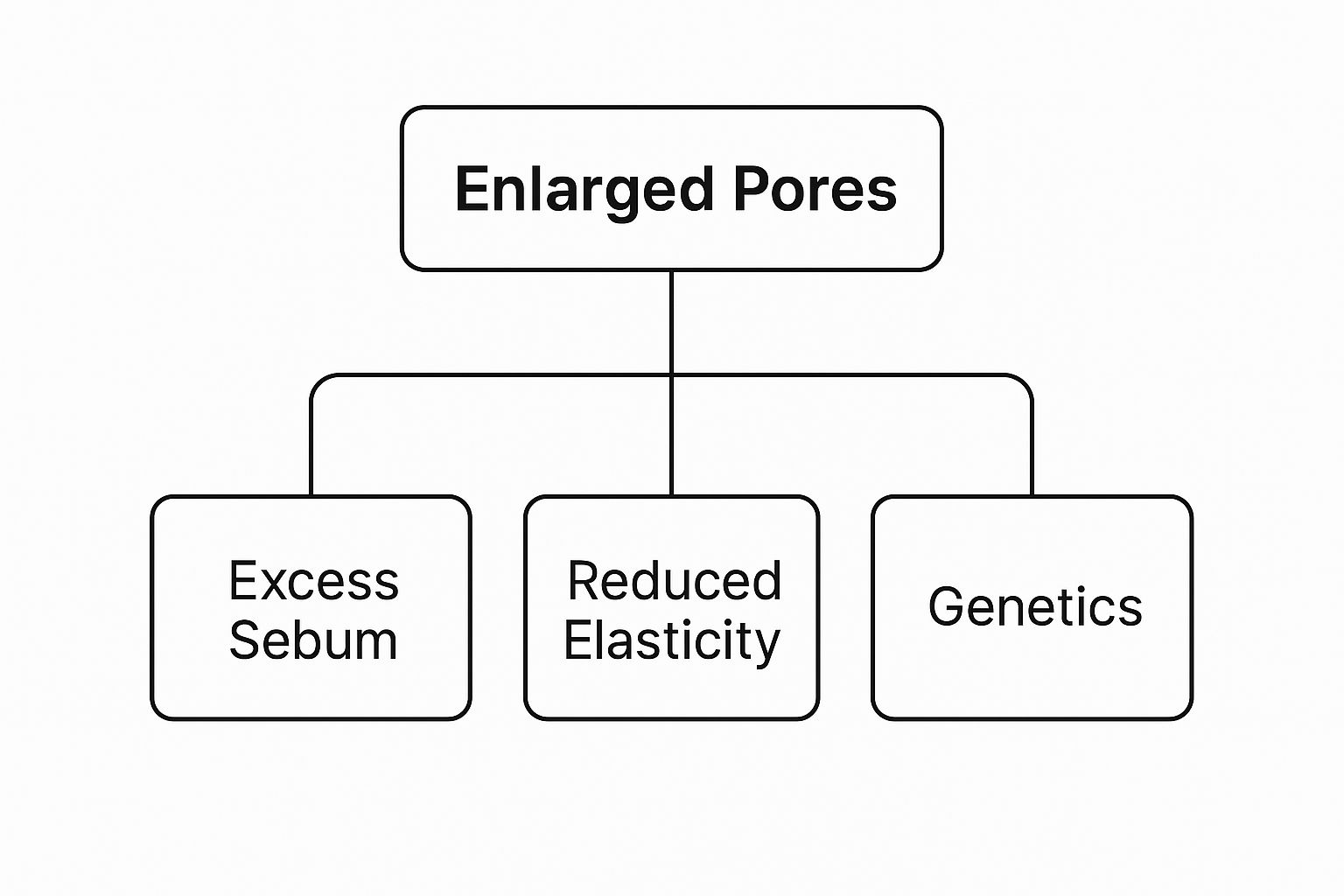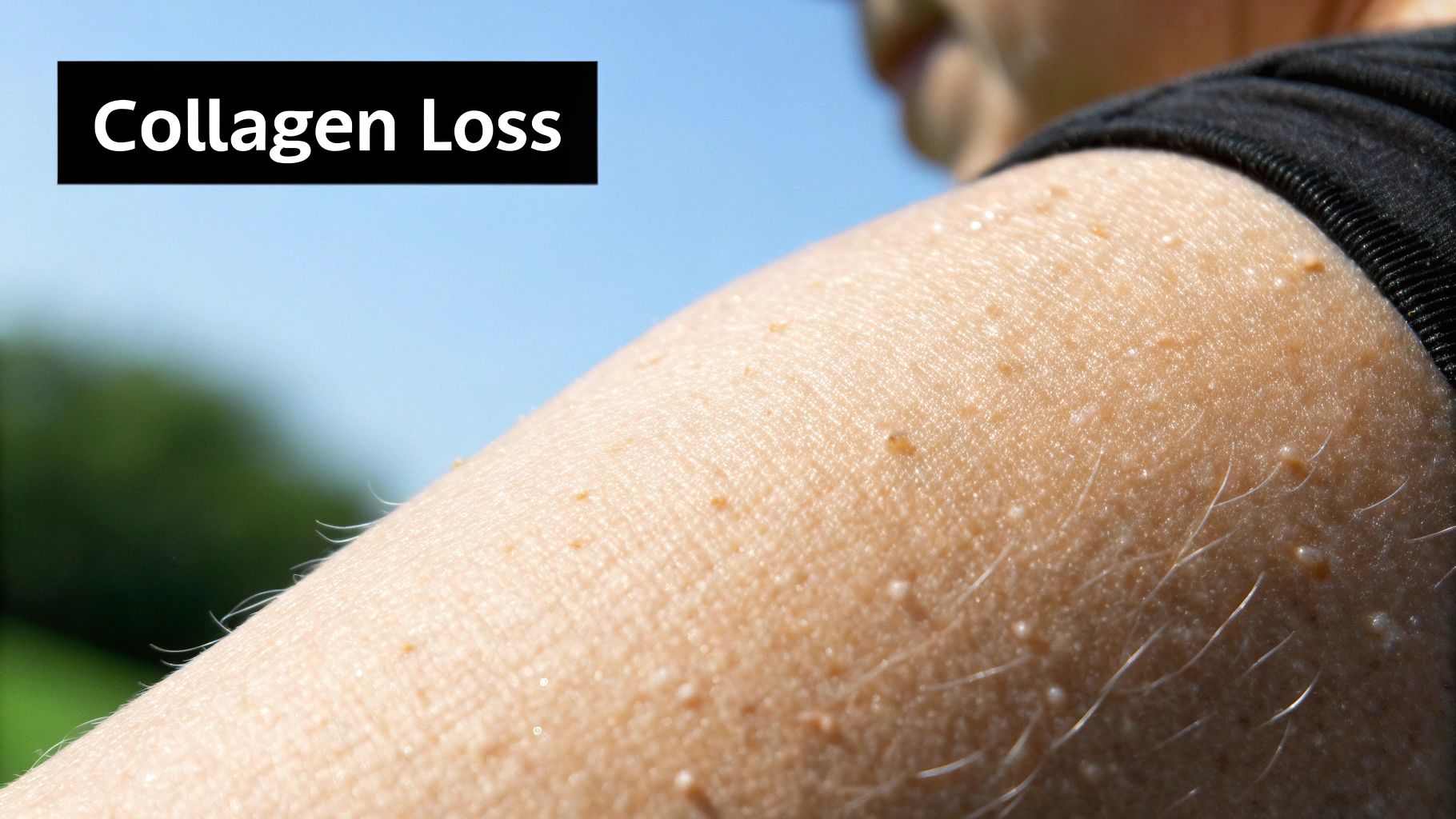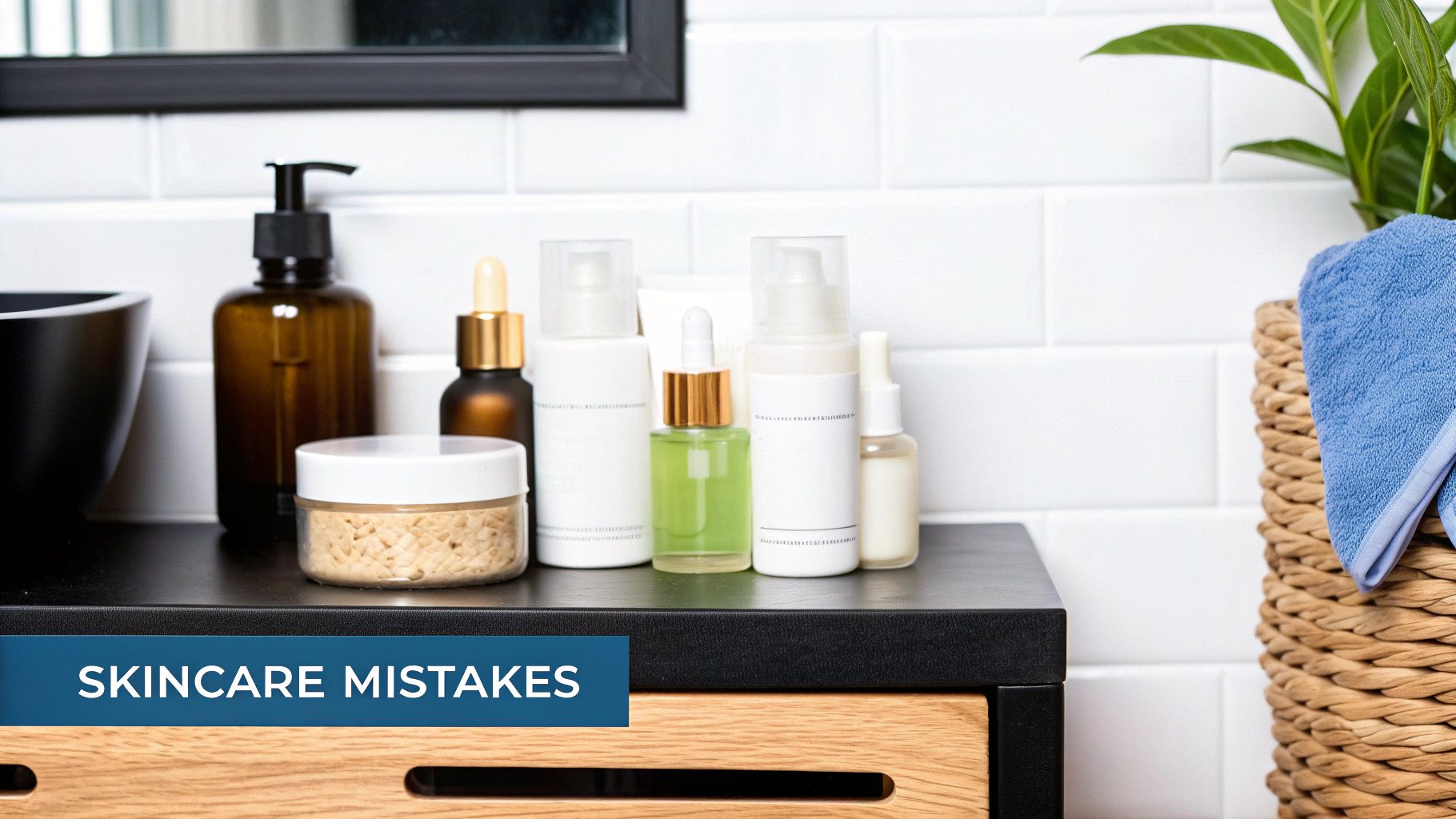What Causes Enlarged Pores? Secrets for Smoother Skin
- Web Dev
- Oct 19, 2025
- 11 min read
Ever look in the mirror and find your gaze fixed on the size of your pores? You're not alone. It’s a common frustration, but the truth behind what causes enlarged pores is often less mysterious than it seems. The main culprits are a trio of interconnected factors: excess sebum (your skin’s natural oil), a gradual decrease in skin elasticity over time, and, of course, your unique genetic makeup.
A New Way of Looking at Your Pores
True skin confidence doesn't come from battling your skin, but from understanding what it’s trying to tell you. Pores aren't the enemy; they're tiny but crucial openings for hair follicles and oil glands that keep your skin moisturised and protected. Sometimes, though, certain triggers can cause them to stretch, making them look bigger than we’d like.
The goal isn't to chase the myth of a "poreless" complexion—because that simply doesn't exist. Instead, this is about paving your own path to healthier, smoother-looking skin. When you get to the root of why your pores appear prominent, you can build a skincare routine that genuinely supports your skin's needs.
Practical Insight: Your journey to feeling good about your skin isn’t about chasing perfection; it's about making progress. Understanding what influences your pores is the first, most empowering step you can take to feel in control and love the skin you're in.
To help you visualise this, the infographic below breaks down how these core factors work together.

As you can see, the appearance of your pores is a story told by your oil production, skin structure, and genetics all playing their part. To make it even clearer, let's look at each of these causes individually.
The Main Causes of Enlarged Pores at a Glance
Sometimes, seeing everything laid out simply is the best way to connect the dots. This table offers a straightforward look at the primary factors that contribute to the appearance of enlarged pores, helping you identify your skin's main challenges.
Primary Cause | How It Affects Your Pores | Your Practical Takeaway |
|---|---|---|
Genetics | Determines your baseline pore size and skin type from birth. | You can't change your genes, but you can manage their effects with the right skincare. |
Excess Sebum (Oil) | Forces pores to expand to release the overproduction of oil. | Focus on balancing oil production, not stripping your skin completely. |
Ageing | Loss of collagen and elastin makes pore walls slacken and appear larger. | Collagen-boosting ingredients like retinoids are your best friends here. |
Sun Damage | Thickens skin and damages collagen, causing pores to stretch. | Daily sunscreen is non-negotiable. It's your number one defence. |
Clogged Pores | Debris and oil physically stretch the pore opening, making it look bigger. | Consistent cleansing and gentle exfoliation are key to keeping pores clear. |
By pinpointing which of these factors resonate most with you, you're already one step closer to building a routine that gives your skin exactly what it needs to look its best.
How Excess Sebum and Debris Stretch Pores

Let’s get right into the most frequent reason pores look bigger, something anyone with oily or combination skin understands intimately: too much oil, or sebum.
Think of each pore as a tiny, flexible container. When your skin is in a happy, balanced state, they do their job without drawing attention. But when your oil glands kick into high gear, that delicate balance is thrown off.
All that extra sebum starts to mingle with whatever is on your skin's surface—dead skin cells, a bit of makeup, and daily grime. This sticky mixture forms a plug that gets lodged inside the pore. With nowhere to go, this buildup literally pushes against the pore walls, stretching them out. The result? The pore looks much larger and more obvious.
It's a frustrating cycle. The very oil meant to keep your skin healthy and moisturised becomes the problem. A major review of clinical studies confirmed this, identifying high sebum production as a crucial factor in enlarging pores because the build-up physically widens the follicles. You can dive deeper into the science by exploring the full study on managing facial pore size.
Why Is Your Skin Producing So Much Oil?
Getting to the root of why your skin is so oily is the first real step toward finding harmony. It's usually not just one single cause, but a mix of what’s happening inside your body and in your environment.
Practical Insight: Finding balance is the goal. Your skin’s natural oil is essential for hydration and protection; the challenge is managing the excess without stripping away the good. This shift in mindset can be a game-changer for your skin's health.
Here are some of the most common culprits behind that unwanted shine:
Hormonal Fluctuations: Big shifts during puberty, your monthly cycle, or menopause can send oil production soaring.
Stress Levels: When you're feeling the pressure, your body releases cortisol. This stress hormone can tell your glands to get to work and produce more oil.
The Wrong Skincare: It’s easy to think that harsh, stripping cleansers are the answer, but they often backfire spectacularly. If your skin feels tight after washing, your cleanser is too harsh. This causes your skin to sense the dryness and overcompensate by pumping out even more oil.
Your Environment: Living in a place with high heat and humidity? That can also stimulate your sebaceous glands and lead to an oilier complexion.
By figuring out what might be triggering your skin, you can start making small, effective changes. This isn't about fighting a war against your skin—it's about learning to work with it to restore its natural equilibrium for a clearer, smoother look.
The Impact of Ageing and Sun Damage on Pore Size

While we often blame clogged pores for their enlarged appearance, the real story goes much deeper. It’s about the very structure of your skin, and two of the biggest culprits that compromise it are the natural ageing process and the sun.
Think of your skin in its youth. It’s supported by a dense, springy network of collagen and elastin fibres—the essential scaffolding that keeps everything firm and lifted. Within this strong framework, your pores are held tight and small.
As the years go by, this internal support system naturally starts to lose its strength. Our bodies produce less collagen, and the existing fibres just don't have the bounce they used to.
How Sun Damage Accelerates the Process
This is where sun damage comes in and really speeds things up. UV radiation is like a wrecking ball for your skin’s structural integrity, causing collagen to break down far more rapidly than it would on its own.
Without that firm scaffolding holding them in shape, the walls of your pores lose their support. They start to slacken and stretch, a bit like the elastic on an old pair of trousers. This sagging effect is what makes the openings look so much larger, even if they aren't actually blocked.
Practical Insight: Your most powerful tool for both anti-ageing and pore refinement isn't a complex treatment—it's your daily sunscreen. Protecting your skin from UV rays is a profound act of self-care that preserves its foundational strength for years to come.
If you suspect sun damage is a key reason for your enlarged pores, targeted treatments like chemical peels for sun damage can make a real difference. To learn more about tackling this, have a look at our complete guide to skin treatment for sun damage. It just goes to show that simple, preventative habits truly are your skin's best friend.
How Your Genes and Hormones Play a Part
Have you ever looked at your parents or siblings and noticed your skin shares the same quirks? It’s not your imagination. While day-to-day things like oiliness and sun exposure definitely matter, the actual starting point for your pore size is handed down through your family tree.
Your DNA essentially provides the blueprint for your skin type, determining whether it’s naturally oily, dry, or a bit of both. If larger pores and oily skin run in your family, chances are you’ve inherited that tendency. It’s the baseline your skin is working from.
This genetic thread also weaves through our ancestry. A fascinating multi-ethnic study, for example, found that Caucasians, who make up a large part of the UK population, tend to have a pore density of around 60-64 pores per square centimetre. It just goes to show how much our heritage can shape our skin. You can dive deeper into these findings on pore density across ethnicities if you're curious.
Knowing this isn’t about feeling stuck with the skin you were born with. Far from it! It’s about understanding your unique starting point so you can find a skincare routine that truly works with your skin, not against it.
The Powerful Influence of Hormones
If genetics set the stage, hormones are the directors constantly changing the scene. These chemical messengers can dial your oil glands up or down throughout your life, which has a direct effect on how visible your pores are.
Practical Insight: Hormonal shifts are a natural part of life's rhythm. If you notice your skin changing at certain times of the month, for example, you can anticipate and respond to these changes by using a clay mask or an exfoliating acid to give your skin the support it needs, right when it needs it most.
You’ve probably seen these hormonal effects in action at different times:
Puberty: This is when androgens (male hormones that everyone has) surge, sending oil production into high gear. It’s a major reason why breakouts and bigger-looking pores are so common in our teenage years.
Menstrual Cycles: Many of us notice our skin getting oilier and pores looking more obvious in the week before a period. This is all down to the ebb and flow of oestrogen and progesterone.
Pregnancy and Menopause: These huge life stages come with massive hormonal shifts that can completely change your skin’s texture and make pores appear more prominent.
By recognising how these internal rhythms affect your skin, you can tweak your routine to give your pores a little extra TLC when they need it most, helping to keep them clear and refined through all of life’s changes.
Common Habits and Skincare Mistakes to Avoid

While genes and hormones certainly play their part, the beautiful thing about skincare is that your daily actions hold immense power. The small, consistent choices you make every day can either support your skin’s health or, without you even realising it, contribute to those enlarged pores you're trying to fix.
This isn’t about blame; it’s about empowerment. Spotting these common missteps is the very first step toward seeing real, lasting results. Many of us fall into habits that seem harmless on the surface but are slowly stretching our pores over time. Let’s look at how you can refine your routine with a few simple, mindful adjustments.
Using the Wrong Products
One of the most frequent mistakes is using skincare and makeup that are comedogenic – a technical term for products that are likely to clog your pores. When a product is too thick, oily, or packed with pore-blocking ingredients, it creates the perfect storm for congestion.
Think of it like this: each day, you might be layering on products that act like tiny plugs, trapping oil and dead skin cells inside. Over time, this constant pressure stretches the pore walls, making them look bigger. Making a conscious switch to "non-comedogenic" formulas is a simple yet profound act of kindness for your skin. For a helping hand, our guide on 8 skincare ingredients to avoid for healthier skin in 2025 can help you start decoding those product labels.
Practical Insight: The most rewarding skincare journey isn't about a complex, 10-step routine. It's about finding clarity. Next time you buy a foundation or moisturiser, just flip it over and look for the words "non-comedogenic." It’s a simple check that makes a huge difference.
Improper Cleansing and Exfoliation Habits
How you wash your face matters far more than you might think. A quick splash in the morning or falling into bed with makeup still on can lead to a surprising amount of buildup.
It’s all about finding that perfect balance.
Inconsistent Cleansing: Not washing your face every single night allows the day's makeup, dirt, and oil to settle deep into your pores, stretching them out while you sleep.
Over-Scrubbing: On the other end of the scale, aggressively scrubbing your face can trigger irritation and inflammation, which ironically makes pores appear even more prominent.
Skipping Exfoliation: Gentle, regular exfoliation is crucial for sloughing away the dead skin cells that cause blockages. Without it, this invisible layer thickens, making it harder for sebum to flow freely.
Here in the UK, acne is a huge factor linked to enlarged pores. A 2021 study in the British Journal of Dermatology highlighted that diagnosed adolescent acne had shot up by 7.4% since 1990. Acne often means more oil and more blockages, which directly cause pores to expand. You can read the findings on acne prevalence in the UK for yourself. Embracing a gentle, consistent cleansing routine is truly your best first line of defence.
Your Action Plan for Pore-Minimizing Skincare
Right, so we've unpacked the 'why' behind enlarged pores. Now for the exciting part: taking back control. Building a consistent, thoughtful skincare routine is your single most powerful weapon in the quest for a smoother, more refined complexion. This is where knowledge truly becomes power.
The secret isn’t a complicated, 10-step routine. It’s about building a simple, effective ritual around a few hero ingredients that get the job done. Think of them as your personal pore-refining dream team, each with a very specific, very important role to play.
Practical Insight: Taking action is a form of self-care. Every step you take in your skincare routine is a positive choice that moves you closer to the radiant, confident skin you deserve. Start small—introduce one new product at a time and give it at least a month to see results.
Key Ingredients for Your Skincare Toolkit
Ready to build your arsenal? Here are the non-negotiables for tackling prominent pores.
Salicylic Acid (BHA): This is your deep-clean expert. Because it's oil-soluble, it can dive right into the pore lining and break down that stubborn gunk made of sebum and dead skin cells. Look for it in a leave-on toner or serum for best results.
Retinoids: These vitamin A powerhouses are famous for a reason. They work by accelerating cell turnover (out with the old, in with the new!) and firing up collagen production, which helps to strengthen and firm up the pore walls from within.
Niacinamide: What a brilliant multi-tasker! This form of vitamin B3 helps get oil production under control while also improving the skin's elasticity. It’s a fantastic two-pronged attack on the main causes of pore visibility.
For those moments when you feel your skin needs an extra push, professional procedures can be a game-changer. You might want to explore effective facial treatments that specifically target pore size and skin texture.
Treatments like chemical peels can offer a much deeper level of exfoliation than you can achieve at home. Similarly, our guide on microneedling provides a great overview of how collagen-boosting therapies can fundamentally improve and refine your skin's texture.
With these strategies in hand, you're not just hoping for better skin—you're making it happen.
Got Questions About Pores? We've Got Answers
Stepping into the world of skincare can feel a bit like navigating a maze. When it comes to something as common as enlarged pores, it's easy to get lost in conflicting advice. Let's clear up some of the most common questions and give you the confidence to care for your skin effectively.
Can You Genuinely Get Rid of Large Pores for Good?
Here’s the honest truth: you can't permanently alter the pore size you were born with—that's down to genetics. But what you can do is make them look dramatically smaller, and that's what really counts.
Think of it this way: a pore filled with oil and debris is stretched open and far more noticeable. A consistent routine that keeps them clear and supports your skin's collagen structure helps them tighten back up, significantly reducing their appearance. It’s all about maintenance.
Are Pore Strips Making My Pores Worse?
Pore strips deliver that instant "wow" factor by yanking out the surface of a blackhead, but that satisfaction is fleeting. They don't get to the root of the problem, and the aggressive pulling can seriously irritate your skin.
Worse yet, that repeated tugging can actually stretch the delicate opening of the pore over time, potentially making them look even bigger in the long run.
Practical Insight: A much smarter and kinder approach is to use a chemical exfoliant, like salicylic acid. It works deep inside the pore to gently dissolve the gunk, preventing the stretching from ever happening. It’s a long-term solution for a truly deep, lasting clean.
If I Could Only Use One Product, What Would It Be?
If you had to pick a single hero product to tackle enlarged pores, a well-formulated BHA (salicylic acid) exfoliant would be it, hands down.
Because it’s oil-soluble, it has a unique ability to travel deep into the pore lining, breaking down the stubborn mix of sebum and dead skin cells that causes blockages. By clearing out the source of the stretch, it makes a visible difference like nothing else.
At YOUTHFUL REVIVAL, our passion is guiding you toward your best-ever skin with expert advice and treatments designed just for you. If you're ready to achieve a smoother, more radiant complexion, let's explore how our advanced skincare solutions can help.

Comments